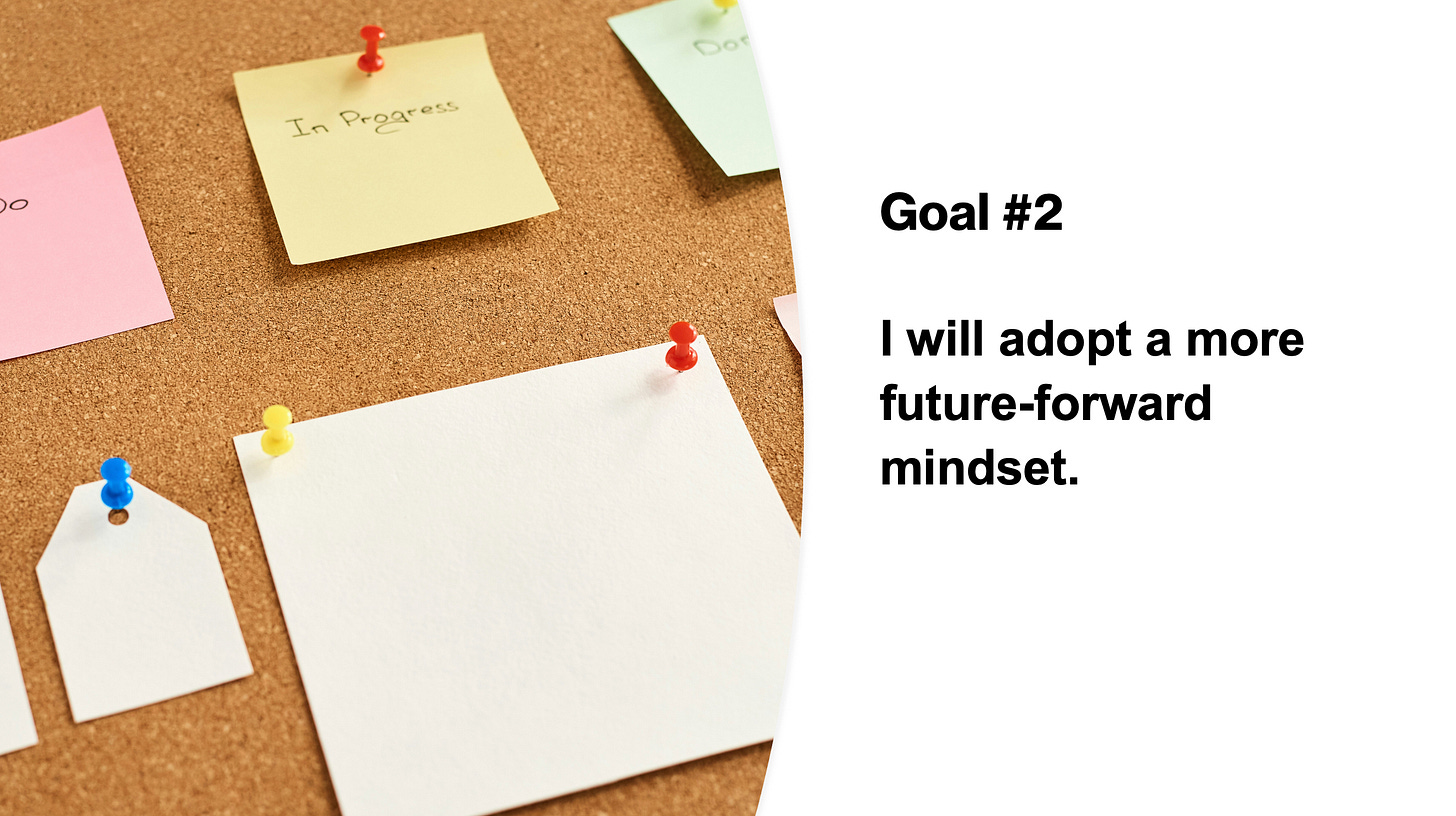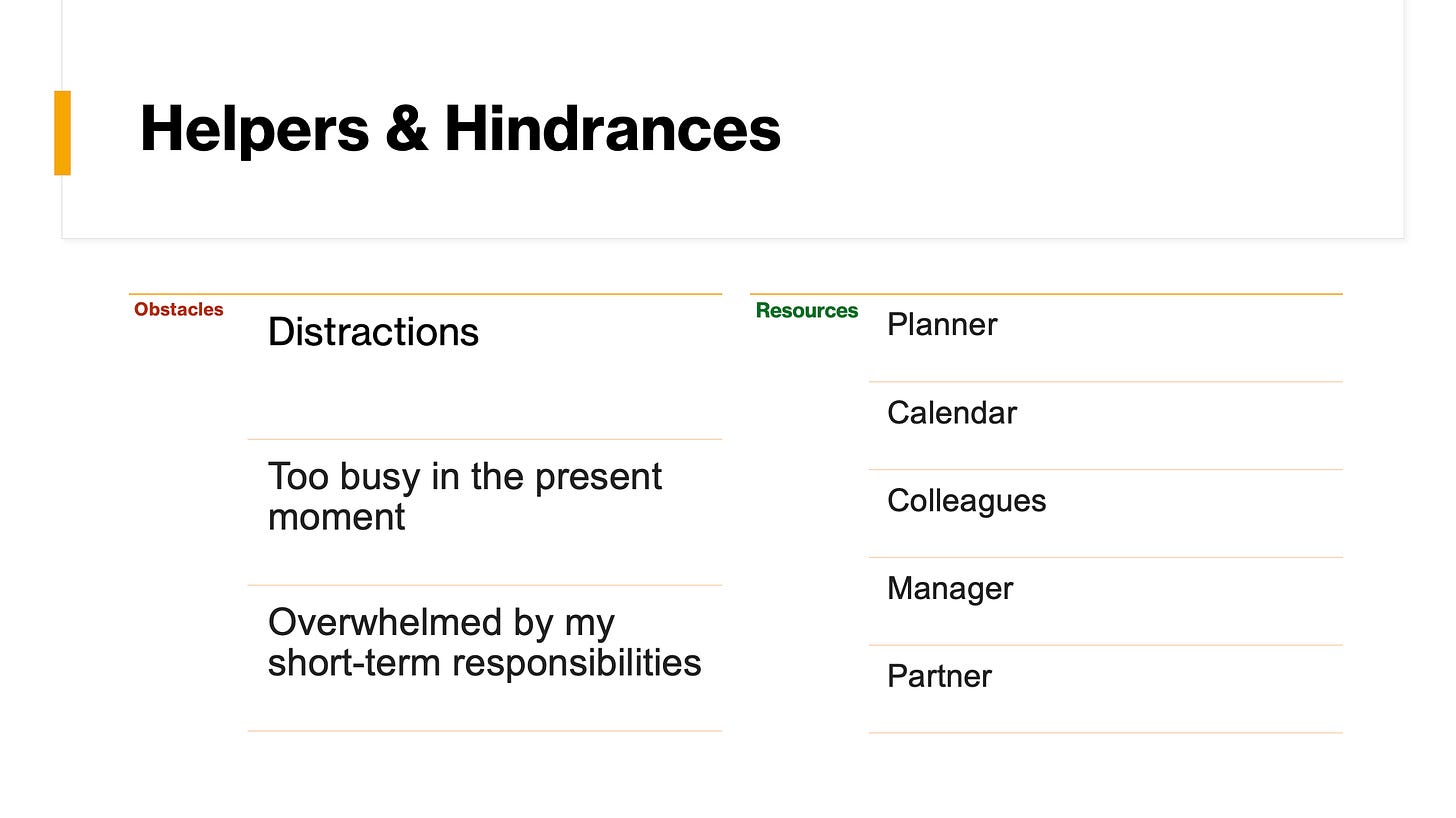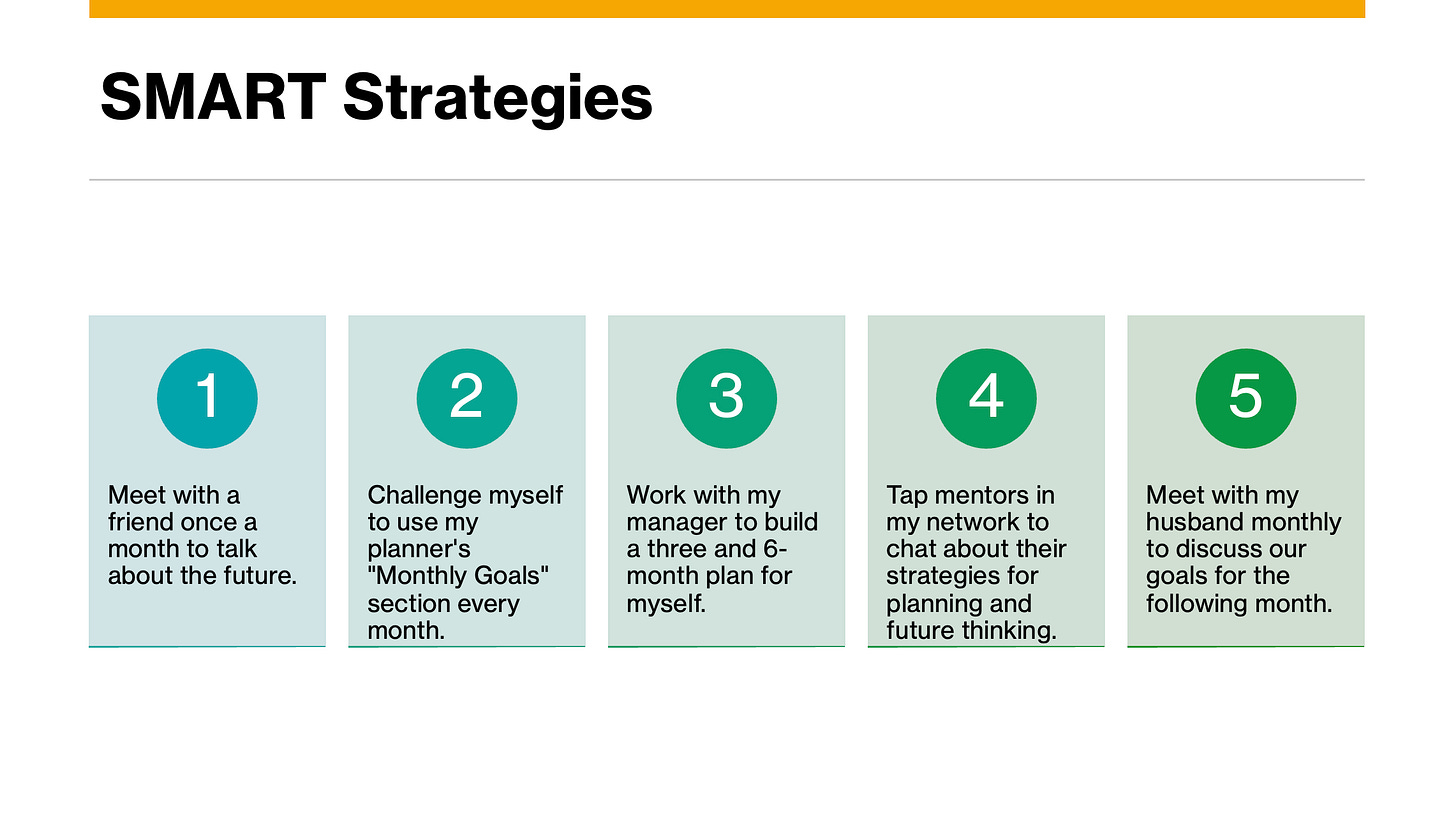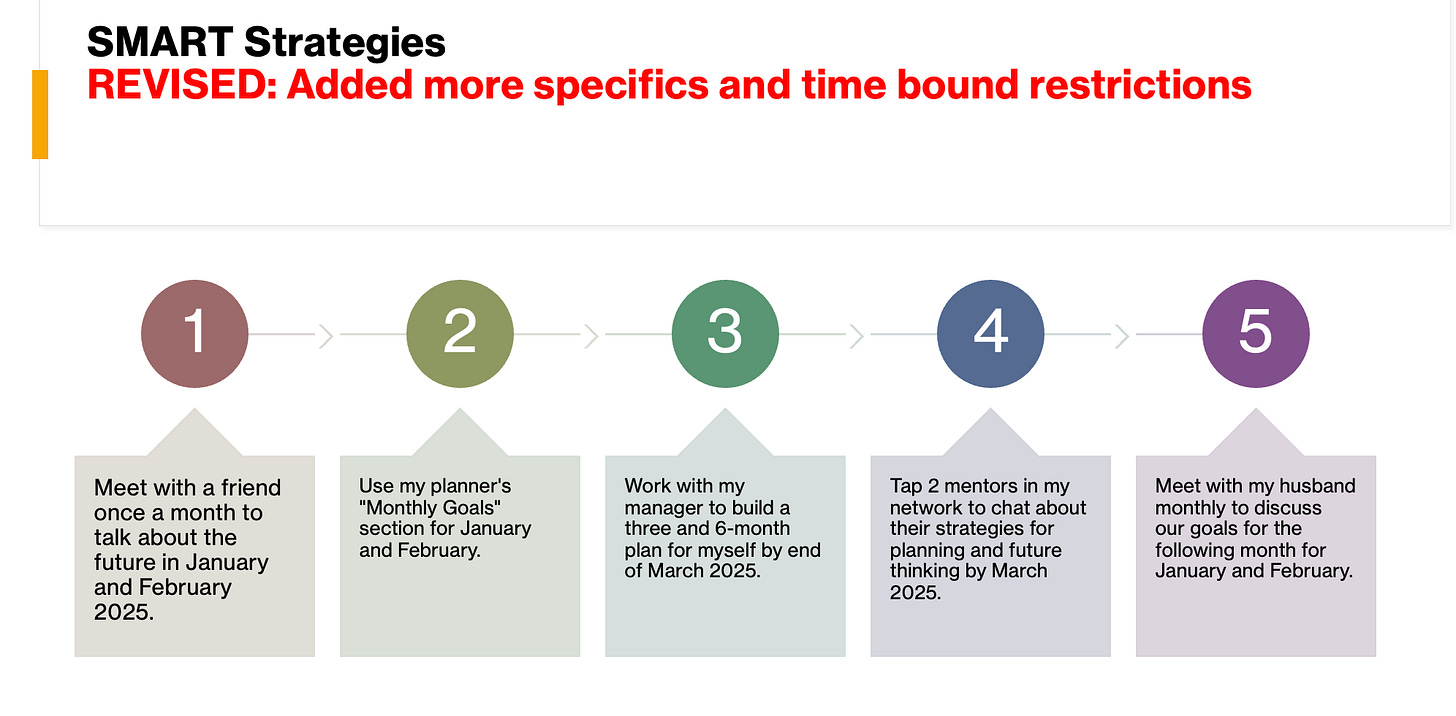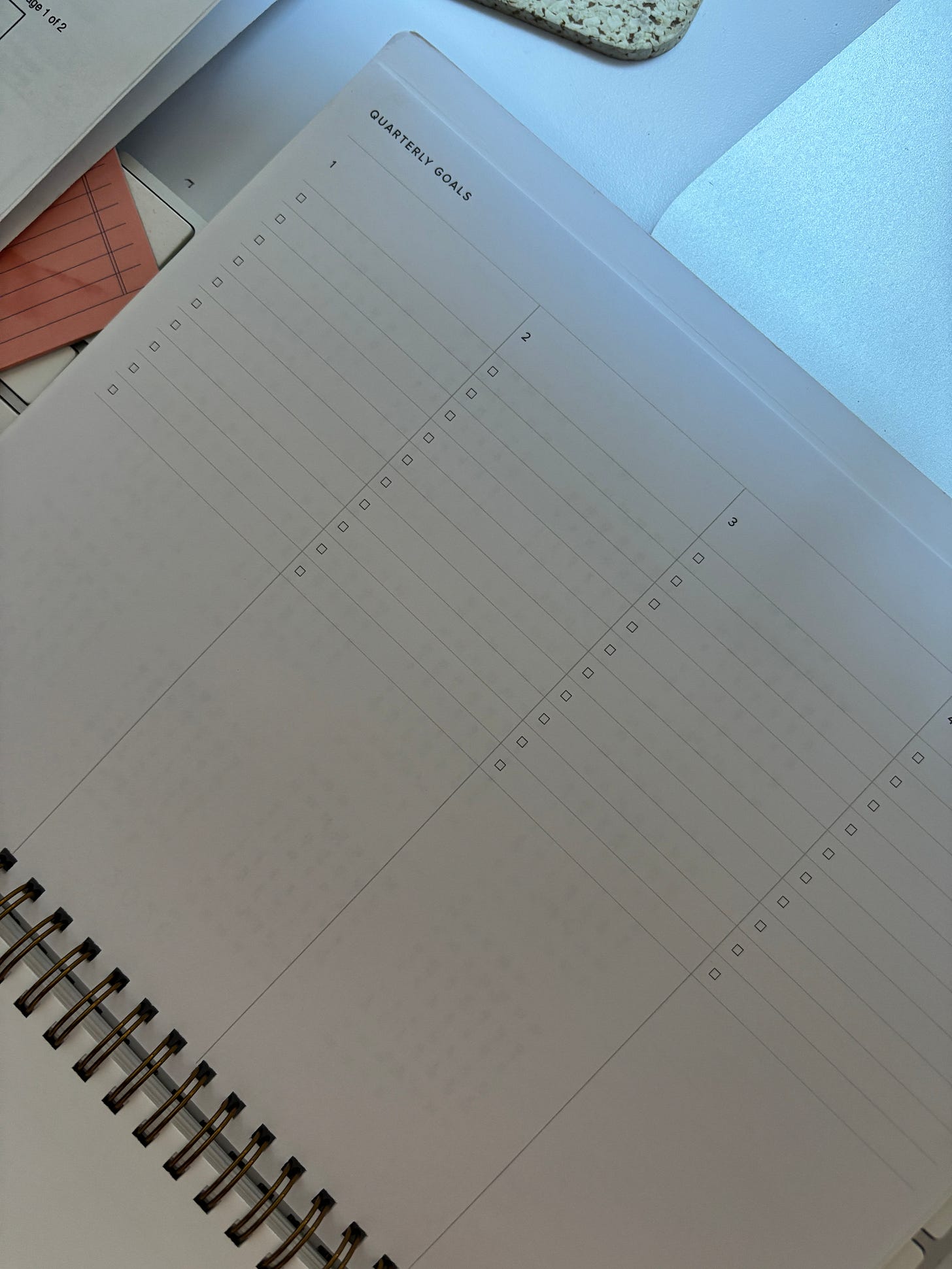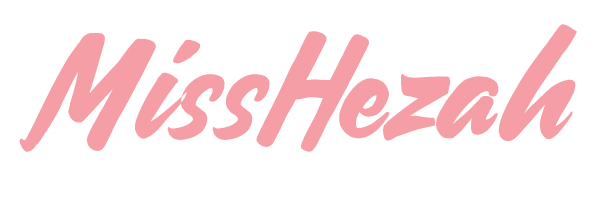It’s the most wonderful time of the year… resolutions and goal-setting SZN!
Just kidding, I actually hate goal setting. This is a spicy take as someone who spent about 20 hours training to do leader development coaching this past fall. And please don’t tell any of my future executive coaching clients that while I’m happy to help them figure their shit out, I’m fairly goal-setting adverse in my own life.
This is despite spending months reading all about the copious research on goal-setting––which is quite clear. Conscious goals–– targets or standards to achieve within a set timeframe––influence our actions. In other words, they work. However, not all goals are created equal. Studies show that goals must be clear and challenging and include regular feedback to track progress. Your goals will have an uphill battle unless you believe in your abilities, can stick to deadlines, and are committed to achieving them. Also, focusing on goals emphasizing learning and improvement will lead to better outcomes than performance metrics. Better to set a goal learning how to knit, rather than knitting five sweaters.
That’s all to say; there’s literature on my side! Some researchers argue that goal-setting can “go wild” by being too specific, narrow, challenging, and ultimately inhibiting learning because you’re so focused on knitting those damn five sweaters instead of trying to master the technique.
I will TRY, but like I said, I don’t like this exercise to begin with. And nor do I like knitting! I don’t know why I chose this example.
I realized that goals gave me the yucks during an assignment for my leader development class this past semester. The structure of the class blended learning how to develop leadership in others while working on personal development plans. I hated working on this plan!! But being the insufferable self-reflective graduate student, this was my cue to attempt to understand why.
Because I wanted to earn good grades, I did my reading (sometimes) and completed my assignments (always), so I eventually trudged through the exercise. One of the big goals in my plan was to be more future-oriented. Great leaders are visionaries. They’re sharp at seeing what’s ahead and know how to identify and implement the necessary changes to correct the path. For me, that feels like an area of untapped potential.
As I mentioned in my last newsletter, I’ve been a bit head-down lately, taking one step before the other. While I know this is how I have to literally operate to get through the week, it doesn’t help my ability to see ahead or execute any strategic vision. The future inspires me and what could be, but as I mentioned…I find the process of planning overwhelming.
The truth is, I don’t like details! I hate editing this newsletter. Don’t get me started on spreadsheets. I don’t want to fill out my timesheet at work. I’m allergic to Asana boards. They all turn me into a petulant child.
I move fast. I like big ideas and brainstorms. Can’t someone else take notes and do the planning? Isn’t there an intern to start the deck outline to respond to that RFP?
“Why don’t you start by writing down everything you want to accomplish for the next week on Sundays,” my professor suggested when I came up stumped on generating SMART (specific, measurable, achievable, relevant, and time-bound) strategies to reach this goal. (I HATE SMART GOALS. The only thing I hate more is knowing they’re effective.)
For the past few years, I have loved using my notebook planner and haven’t had an issue plotting out my week or two ahead of time. However, I have noticed that I tend to skip past the monthly calendar overview and the page specifically dedicated to “month goals.” No, thank you! I'm not going there!!
Weird, right?
This struck me as very silly but also revealing. The pain point is not the act of planning but the time frame. I’m OK thinking about immediate next steps and am comfortable with long-term road mapping, like one to several years in advance. However, the mid-range bands of time, like one to a few months, feel like nails on a chalkboard.
Maybe it’s about accountability. When thinking so far into the future, I usually want to accomplish things that take a great deal of vision. And yet, wants are squishing and subjective little things that are hard to pin down and notorious for evolving. Their nature makes it easy to circumvent holding myself to anything in particular. “It’s a nice thought, but so much can happen between then and now,” I can justify.
Considering the short-term, upcoming week or two, it’s not so much about the wants as the NEEDS. Short-term goal-setting is organizing and knocking out tasks. They’re typically pretty straightforward, and hot damn if it isn’t satisfying to create and check off a bunch of lists. But there’s not much room to be visionary when looking only as far as the end of your nose.
So, what exists between a want and a need? A nice-to-have? Why are those so hard for me to deal with? Maybe it’s something I want to accomplish that’s absolutely within reach but without the ambiguity of the distant future. I'm on the hook if I set that goal but never quite figure out the path to achievement and see it to fruition.
No one wants to be left responsible, right?! Especially when you’re the only one to blame.
Obviously, I didn’t do any of this introspection work before setting the goals for my leader development plan assignment. Because as I shared in my last newsletter, my life looks like this:

So, this is the goal-setting I did back in October:
We were asked to submit a revised development plan at the end of class. While I had progressed on my other two goals, this one was in complete stasis. I resubmitted the plan and updated my strategies to make it SMARTER.
Ugh, it makes me queasy just looking at it! Accountability for my nice-to-haves is nauseating. But I’m determined to overcome my fear of mid-range goals in 2025—a noble quest, to be sure. Perhaps I just need to thnk about it in a new way.
One of my mentors and colleagues––organizational development expert Malika Begin, recently reframed accountability—not as a consequence of inaction but as a predictor of action. She suggested that accountability allows you to take ownership of your decisions and contributions. It’s not a punishment, even though it’s commonly portrayed as such. I like that!
And,
, brains behind Sprinkles Cupcakes and current Shark Tank Shark, just offered up an alternative way to think about goals setting I loved in her latest newsletter, called an Year End Audit.Here’s what I’ve realized about New Year’s resolutions—they often feel like we’re starting from scratch on January 1st, as if the previous 365 days didn’t happen. But our lives don’t work in these neat, compartmentalized chapters. Every year is built on the foundation of the one before it, shaped by the habits we’ve formed, the progress we’ve made, and yes, even the things that didn’t quite go as planned.
So, instead of making brand-new resolutions for 2025, what if we first got smart about understanding our current trajectory? After all, how can we know where we want to go if we haven’t really reflected on where we’ve been?
This is why I swear by a Year End Audit—a practice that has completely reframed how I approach goal-setting. It’s not about adding more to your plate or creating a rigid plan; it’s about taking stock of your natural momentum. When you understand what’s already working (or not), you can make more intentional choices about what to amplify, adjust, or leave behind.
If you’re inspired to try a Year Audit, here are five questions to guide you:
What were your unexpected wins this year?
Which activities or habits energized you—and which ones drained you?
What didn’t work, and should you adjust it or let it go?
Where do you want to deepen your investment of time, energy, or resources?
What do you want to try that’s new in 2025?
I like this a lot too! Read her whole piece to get more insight.
Ok, I have the tools, the resources, the reframes, and a fresh new planner with twelve new opportunities to practice mid-range and long term planning. And, according to this plan I made for myself, I only have until March to put it in action.
Oy vey.




